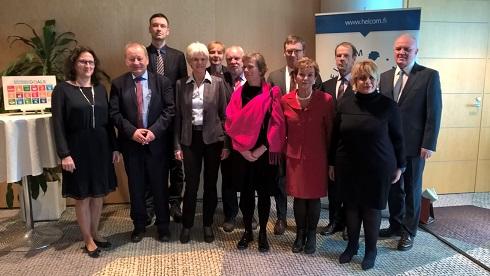HELCOM high-level session
Regional take on ocean-related sustainable development goals
28 February 2017 Helsinki, Finland
High-level representatives of the Baltic Sea countries and EU met on 28 February 2017 on the occasion of the 38th Meeting of the Helsinki Commission to discuss how to achieve ocean-related Sustainable Development Goals in the Baltic Sea and progress in addressing regional environmental challenges.

Outcome of the high-level session:
High-level representatives
MsJoanna Drake, Deputy Director General of DG Environment in the Commission, European Union;
MrMariusz Gajda, Undersecretary of State of the Ministry of the Environment, Poland;
Mr Mindaugas Gudas, Vice-Minister, Ministry of Environment, Lithuania;
Mr Vladimir Ivlev, Deputy Director of the DIC, Ministry of Natural Resources and the Environment, Russia;
Mr Harry Liiv, Deputy Secretary General, Ministry of the Environment, Estonia;
MsHannele Pokka, Permanent Secretary of the Ministry of the Environment, Finland;
Ms Iveta Teibe, Head of Water Resources Division, Department of Environmental Protection, Ministry of Environmental Protection and Regional Development, Latvia;
Mr Helge Wendenburg, Director General, Water Management and Resource Conservation, Federal Ministry for the Environment, Nature Conservation, Building and Nuclear Safety, Germany;
MrPer Ängquist, State Secretary for Environment and Energy, Sweden;
Ms Lisbet Ølgaard, Head of Division, The Agency for Water and Nature Management, Ministry of Environment and Food, Denmark;
Ms Marianne Wenning, Chair of the Helsinki Commission;
MsMonika Stankiewicz, Executive Secretary of the Helsinki Commission
BACKGROUND FOR THE HIGH-LEVEL SEGMENT
HELCOM has for over forty years provided a platform for the governments of the Baltic Sea countries and EU to discuss and agree on measures to prevent and eliminate pollution from all sources in order to promote the ecological restoration of the Baltic Sea Area and the preservation of its ecological balance, thus, achieving and maintaining a good environmental status of the Baltic Sea and ensuring the sustainable use of its natural resources.
While many of the measures are to be implemented nationally, it is the joint regional HELCOM cooperation based on the Convention and involving all Baltic Sea countries and a broad range of stakeholders, which is capable of providing the key to effectively implement and monitor the ecosystem approach and sustainable use of resources in the region. This is the benefit of regional approaches that ensure tackling the challenges we are facing. The Baltic Sea Action Plan, adopted in 2007, provides a concrete basis for HELCOM work to restore the good ecological status of the Baltic marine environment by 2021.
Current chairmanship in HELCOM is held by the European Union (July 2016-June 2018). Priorities of the chairmanship focus on further implementation of the HELCOM Baltic Sea Action Plan and the follow-up commitments.
In 2015, the UN General Assembly adopted the 2030 Agenda for Sustainable Development including 17 Sustainable Development Goals (SDGs) and 169 associated targets.
The Council of the Baltic Sea States (CBSS) adopted the declaration “Baltic 2030: Renewing the Commitment to Sustainable Development in the Baltic Sea Region” in June 2016.
The second session of the United Nations Environment Assembly (UNEA) “invited Member States and regional seas conventions and action plans, in cooperation, as appropriate, with other regional organizations and fora, such as regional fisheries management organizations, to work towards the implementation of, and reporting on, the different ocean-related Sustainable Development Goals and associated targets, the Strategic Plan for Biodiversity 2011-2020 and its Aichi Biodiversity Targets” (Resolution 2/10 (Oceans and Seas)).
HELCOM is one of 18 Regional Seas Conventions and Action Plans in the world working together under the umbrella of UNEP.
One of the Sustainable Development Goals fully dedicated to the conservation and sustainable use of the oceans and seas – number 14 – is co-led globally by one Contracting Party of the Helsinki Convention, Sweden with Fiji. The United Nations Conference “Our oceans, our future: partnering for the implementation of Sustainable Development Goal 14”, 5-9 June 2017, New York, is an opportunity for Contracting Parties to make a contribution and consider a joint follow-up.
